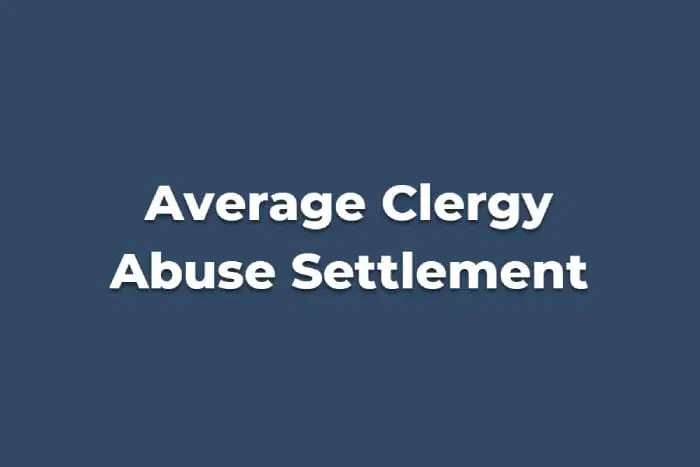
Average Clergy Abuse Settlement (2024 Update)
Legally reviewed by: Jessica Anvar Stotz, JD, MBA
Short answer: According to data from four recent Catholic diocese lawsuits, the average clergy abuse settlement can range from approximately: $250,000 – $460,000. Settlements on the larger end can be worth more than $1,000,000. An example of this would be the Archdiocese of Los Angeles settlement in 2007 which agreed to pay $660 million to 508 victims.
Clergy Sexual Abuse Settlements at a Glance
| Settlement Range | Settlement Amount |
| Lower Tier | Approximately: $200,000 – $350,000 |
| Mid Tier | Approximately: $350,000 – $500,000 |
| Higher Tier | Approximately: $500,000 – $1,300,000+ |
Recent Example Settlement Amounts
- A New Jersey Catholic diocese agrees to pay $87.5M to settle sex abuse lawsuits
- Seattle Archdiocese pays $2.3 million to settle five claims of sexual abuse
- Syracuse Diocese Paying Sex Abuse Survivors $100 Million—Largest Settlement Since 2007
- New York diocese offers $200 million to abuse victims in largest-ever settlement offer
- Archdiocese of St. Louis settles sex abuse suit with alleged victim, agrees to pay $1 million
Factors That Affect Clergy Abuse Settlements
Several factors can influence the settlement amounts in clergy abuse cases. It’s important to note that each case is unique, and the settlement amount can vary based on specific circumstances. Here are some factors that commonly affect settlement amounts in clergy abuse cases:
Severity of Abuse
The extent and severity of the abuse suffered by the victim can significantly impact the settlement amount. More severe cases may result in higher compensation.
Duration of Abuse
The length of time over which the abuse occurred can be a factor. Prolonged or repeated instances of abuse may contribute to larger settlements.
Emotional Distress
The emotional and psychological impact on the survivor is a key consideration. Settlement amounts often account for the emotional distress caused by the abuse.
Medical Costs
Reimbursement for medical expenses related to the abuse, including therapy, counseling, and other healthcare costs, may be factored into the settlement.
Loss of Income
If the survivor experienced a loss of income or earning capacity due to the abuse, this may be considered in determining the settlement amount.
Age of the Survivor
The age of the survivor at the time of the abuse and at the time of the legal proceedings can influence the settlement. Minors or vulnerable individuals may receive higher compensation.
Impact on a Survivor’s Life
The profound impact of the abuse on the victim’s life, including long-term emotional and psychological effects, may be considered when determining the settlement amount.
Evidence and Witnesses
The strength of the evidence and the availability of witnesses can impact the likelihood of success in court. A strong case may result in a more favorable settlement.
Negotiation Skills
The skills and experience of the legal representatives involved in negotiating the settlement can play a crucial role. Experienced attorneys may secure better outcomes for their clients.
Jurisdictional Differences
Laws regarding clergy abuse and compensation can vary by jurisdiction. Settlement amounts may be influenced by the legal landscape in the specific location where the case is filed.
Insurance Coverage
The availability and extent of insurance coverage held by the religious institution may affect the settlement amount. Insurance policies may contribute to the overall compensation.
Financial Resources of the Institution Involved
The financial strength of the institution accused of abuse can impact the settlement negotiations. Institutions with substantial resources may be more likely to offer larger settlements.
Public Perception
The potential impact on the reputation of the religious institution involved may factor into negotiations. Institutions may be more inclined to settle to avoid negative publicity.
Understanding these factors can help individuals involved in clergy abuse cases, as well as those seeking information on the topic, navigate the complexities of legal settlements.
Why Do Some States Offer Larger Settlements Than Others?
The settlement amounts in clergy abuse cases can vary from state to state due to several factors, including legal nuances, cultural differences, and the specific laws governing such cases. Here are some reasons why settlement amounts might differ between states:
Legal Framework
Each state has its own legal framework and statutes regarding personal injury, including clergy abuse cases. Variations in these laws can impact the amount of compensation available to survivors.
Statutes of Limitations
The statutes of limitations, which determine the time within which legal action must be initiated, differ among states. Some states may have longer or shorter timeframes for filing clergy abuse lawsuits, affecting the amount of compensation survivors can pursue.
Civil Lawsuit Caps
Some states may have caps or limits on the amount of money that can be awarded in civil lawsuits, including those related to clergy abuse. These caps can influence the maximum settlement amount survivors can receive.
Insurance Coverage
The availability and extent of insurance coverage held by religious institutions can vary. States with institutions that have more comprehensive insurance coverage may be able to offer larger settlements.
Legal Precedents
Previous legal decisions and precedents in each state can influence the outcomes of clergy abuse cases. Some states may have a history of higher or lower settlements based on past legal rulings.
Public Awareness and Advocacy
States with higher public awareness and advocacy for survivors of clergy abuse may see increased pressure on institutions to provide larger settlements. Public sentiment and activism can influence legal outcomes.
Societal Attitudes
Cultural and societal attitudes toward clergy abuse may differ between states, affecting how these cases are perceived and adjudicated. States with a greater emphasis on victim rights may see higher settlements.
Economic Factors
The economic conditions of a state can play a role. States with a higher cost of living or greater economic prosperity may see larger settlements to account for the financial impact on survivors.
Individual Case Circumstances
The unique circumstances of each case, including the severity of the abuse, the strength of evidence, and other individual factors, can contribute to varying settlement amounts.
It’s important to recognize that these factors interact in complex ways, leading to the observed differences in settlement amounts across states.
Survivors and their legal representatives need to be aware of the specific legal landscape in their jurisdiction to navigate these complexities effectively.
Steps to Consider for Filing a Lawsuit
Seek out an experienced attorney
A clergy abuse attorney can assist you throughout the process, carefully listening to the details of your abuse and advising on the most suitable course of action.
Be aware of the statute of limitations
Each state imposes its own time frame for initiating church abuse lawsuits. While some states have recently extended these limitations, granting victims more time to file, others maintain shorter deadlines.
Initiating the process promptly is advisable to avoid forfeiting your legal right to compensation due to a statutory deadline.
Consider tolling and the discovery rule
Certain states permit extensions to the statute of limitations based on when information about the abuse was uncovered (referred to as the “discovery rule”), particularly in cases involving fraudulent concealment where details about the abuse were intentionally hidden by the church.
Additionally, some states allow the statute of limitations to be temporarily paused (known as “tolling”), affording victims extra time to pursue legal action.
Initiate a personal injury lawsuit
In numerous instances, survivors of clergy abuse have the option to file a personal injury lawsuit against the church. Furthermore, parents of children who have experienced molestation or assault by church officials may also be eligible to file a lawsuit on behalf of their child.
It’s crucial to keep in mind that the specific procedures for filing a clergy abuse lawsuit can vary based on jurisdiction and the unique circumstances of each case. Therefore, consulting with a qualified clergy abuse lawyer is essential to receive tailored guidance aligned with your particular situation.
California Eliminating Statute of Limitations for Child Sex Abuse Lawsuits Under New Law
According to the California state senate website, California will eliminate the statute of limitations for people to file lawsuits over allegations of child sexual assault under a new law Gov. Gavin Newsom signed Tuesday.
The new law won’t apply to any instances of sexual assault that occurred before the bill takes effect at the start of 2024. But moving forward, it will eliminate what advocates say is an unfair deadline California law now places on people who suffered abuse as children.
This will not only help survivors of clergy sexual abuse seek compensation, but also survivors of other institutions like schools.
What Can Taking Legal Action Do?
Legal action holds individuals and institutions accountable for abusive actions, fostering a sense of justice for survivors. Also, seeking assistance helps survivors understand the abuse was not their responsibility, offering some validation. Additionally, it links them with supportive networks and valuable resources to help them receive psychological and emotional support.
Finally, initiating legal action against clergy abuse enables survivors to pursue compensation, a crucial step towards addressing the profound impact of their experiences.
This compensation can serve as a financial resource to cover medical bills and therapy expenses, offering a means to access necessary healthcare and support services.
Beyond monetary restitution, it serves as a pathway for individuals to rebuild their lives, offering the financial means to facilitate their healing journey and move forward from the trauma inflicted upon them.
Get Connected with an Attorney Today
Looking to speak with an attorney? Contact LawLinq to get connected with some of the best clergy abuse attorneys in the state. All initial consultations are free and confidential.


